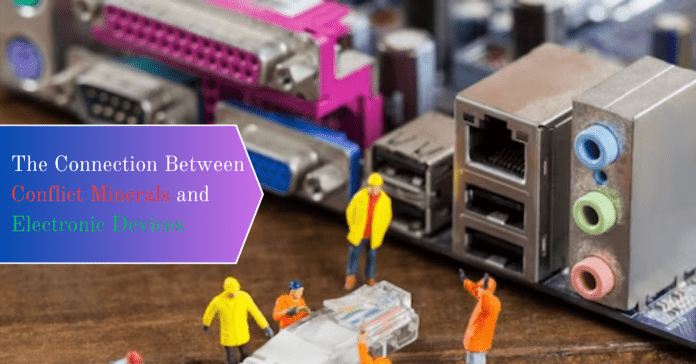In our interconnected world, electronic devices have become indispensable, seamlessly integrating into our daily lives. However, beneath the sleek surfaces and advanced technologies lie complex supply chains, where the sourcing of materials, particularly conflict minerals, has profound implications.One of the major concerns around conflict minerals is their link to human rights abuses and armed conflict in certain regions of the world. To address this issue, companies are increasingly implementing conflict mineral compliance programs to ensure that their supply chains are free of these materials. Such programs involve tracing the origins of minerals used in their products and ensuring that they are not sourced from conflict-affected regions. While these efforts have made progress, there is still much work to be done to ensure that the electronics industry is not implicated in human rights violations and armed conflict. This article delves into the intricate connection between conflict minerals and electronic devices, exploring the challenges, ethical considerations, and industry initiatives shaping the landscape.
Understanding Conflict Minerals
Conflict minerals, comprising tantalum, tin, tungsten, and gold (often referred to as 3TG), are sourced from regions plagued by social and political unrest, contributing to human rights abuses and environmental degradation. These minerals are vital components in the production of various electronic devices, ranging from smartphones and laptops to tablets and wearables.
The High Stakes in Electronics
Electronics manufacturers rely on these conflict minerals due to their unique properties. Tantalum, for instance, is used in capacitors, tin in soldering, tungsten in electronic components, and gold in circuitry. As demand for electronic devices continues to surge globally, so does the demand for these minerals, amplifying the challenges associated with responsible sourcing.Some electronics companies also offer PCB design services to their clients, which involves designing and prototyping circuit boards for various electronic devices.
Challenges in the Supply Chain
The complexity of electronic supply chains poses challenges in tracking the origin of minerals. Often, these minerals pass through multiple intermediaries before reaching manufacturers, creating opacity in the supply chain. This lack of transparency makes it difficult for companies to ensure that the minerals used in their products are conflict-free.
Ethical Considerations for Manufacturers
Electronics manufacturers face a moral dilemma: how to meet consumer demand for cutting-edge devices while ensuring their supply chains adhere to ethical standards. The link between conflict minerals and electronic devices places a responsibility on manufacturers to implement robust due diligence processes, fostering transparency and accountability.
Industry Initiatives and Compliance
Recognizing the ethical concerns surrounding conflict minerals, various industry initiatives and regulatory frameworks have emerged. The Dodd-Frank Wall Street Reform and Consumer Protection Act in the United States, for example, requires companies to disclose their use of conflict minerals. Global initiatives, such as the Responsible Cobalt Initiative, aim to extend responsible sourcing practices beyond 3TG minerals.
Technological Solutions for Traceability
Advancements in technology offer hope for improving traceability in the supply chain. Blockchain, in particular, is gaining traction as a tool to create immutable and transparent records of mineral transactions. By providing a decentralized ledger, blockchain enhances accountability, enabling manufacturers and consumers to trace the journey of minerals from extraction to the final product. SDS services further contribute to this traceability, ensuring comprehensive and accurate data management throughout the supply chain.
Corporate Social Responsibility
As consumers become increasingly conscious of the social and environmental impact of their purchases, corporate social responsibility (CSR) plays a pivotal role. Electronics companies are under pressure to adopt ethical sourcing practices, with consumers rewarding those who demonstrate commitment to conflict-free minerals and sustainable supply chains.
Challenges of Responsible Mineral Sourcing
Despite progress, challenges persist. The geographical complexity of mineral-rich regions, coupled with the intricate web of intermediaries, hinders efforts to eradicate the use of conflict minerals. Additionally, implementing responsible mineral-sourcing practices requires collaboration across industries, governments, and advocacy groups.
The Road Ahead: Toward Responsible Electronics
The nexus between conflict minerals and electronic devices underscores the need for a comprehensive and collaborative approach. Manufacturers must invest in due diligence, leveraging technological solutions such as Allegro PCB, and actively participating in industry initiatives to create a transparent and responsible supply chain. Consumers, armed with awareness, can drive demand for ethically sourced electronics, urging companies to prioritize social and environmental responsibility.
Conclusion
The connection between conflict minerals and electronic devices highlights the intricate ethical considerations woven into the fabric of our technologically-driven world. As the electronics industry navigates this complex landscape, a commitment to responsible sourcing, facilitated by services like PCB layout services, is not only an ethical imperative but a strategic necessity. By acknowledging the challenges, embracing technological solutions, and fostering a culture of transparency, the industry can pave the way for a future where electronic devices are not only cutting-edge but ethically sound.
